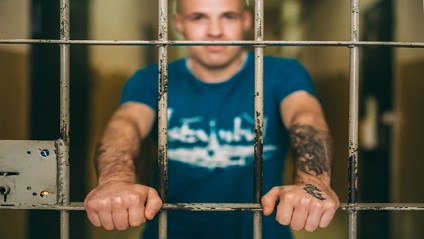Criminal Justice and Health in Prison Programme (CJHP)

Limiting the spread of communicable diseases in prisons thus benefits detainees as well as society as a whole, and reduces the burdens on a country's health system. Consequently, drug policy experts around the world recommend developing drug treatment services, harm reduction interventions and criminal justice policies that support alternatives to imprisonment for people who use drugs and are in trouble with the law. In Europe, the Pompidou Group’s Criminal Justice and Health in Prison Programme (CJHP) supports governments in developing human rights-based criminal justice policies and comprehensive drug treatment systems in prisons.
Poster of the Programme
 An integrated approach for human rights and health
An integrated approach for human rights and health
The Pompidou Group ensures an enduring transfer of knowledge and an integrated approach based on cutting-edge science. Embedded in this vibrant process of mutual interaction, the Criminal Justice and Health in Prison Programme (CJHP) is closely linked with other areas of the Pompidou Group’s work, such as prevention, treatment and law enforcement. Its action is centred on three main tasks: the development and improvement of national legal frameworks (policy) and the enhancement of both the professional skills (practice) and knowledge (research) of those working in the criminal justice system.
 Drug treatment in the criminal justice system
Drug treatment in the criminal justice system
The various projects under the Criminal Justice and Health in Prison Programme (CJHP) support governments in developing strategies and programmes involving drug treatment and social re-integration for people in detention who use drugs – in an effort to reduce relapse and recidivism. An effective and people-centred drug treatment system should comprise pharmacologically assisted treatment (like opioid agonist therapy), harm reduction and drug-free approaches (such as therapeutic communities). Agonist treatment is an effective and important tool in the fight against HIV and hepatitis C, and can help people with opioid dependence to stop or at least reduce their use of illicit drugs. Drug-free treatment also addresses people with substance use disorders who are not eligible for substitution treatment programmes, or are unwilling to sign up for it. It is crucial to recognise that drug treatment services are especially effective if they are embedded in the general health and social care system. The promotion of through-care can sustain drug treatment efforts and ensure continuing care for people entering and leaving prison.
Read Interview "Tangible results in Europe"
Download Publication “Mental Health and Addiction in Prisons”
 Programme achievements
Programme achievements
The Criminal Justice and Health in Prison Programme (CJHP) has achieved tangible results in many European countries. Each country has its own special needs and challenges and together with our local partners, the Criminal Justice and Prison Programme develops result-oriented strategies.
In Georgia, the Pompidou Group has helped public administrations to improve alternatives to punishment for people who are in trouble with the law because of drug offences by developing a road map for relevant policy changes. Also, practical solutions for more effective rehabilitation of detained people with substance use disorders were developed at a major conference bringing together over 100 policy makers, practitioners, experts and civil society representatives. The key points were summarised in the “Tbilisi Declaration”.
Together with the National Administration of Penitentiaries of the Republic of Moldova, the Programme introduced the country’s first in-prison therapeutic community for treating addictions. Rehabilitation and through-care of residents is supported with social activities and a post-release mentorship programme with close co-operation between prison administration and civil society.
Download Handbook on prison-based Therapeutic Communities
Watch video on the Therapeutic Community Catharsis
Watch video "Gaining freedom in Prison"
Watch video on Opiate Agonist Treatment in Moldovan Prisons
Addressing the role of criminal subculture (English version)
Addressing the role of criminal subculture (Romanian version)
In Ukraine, drug treatment and prevention tools such as the family conferencing method were introduced in juvenile prisons. The Programme also supported the introduction of opioid agonist treatment in Ukrainian prisons through training activities to effectively fight HIV and other blood-borne diseases among the prison population.
Watch video on Family Conference in Pryluky, Ukraine
Read more about the introduction of opioid agonist treatment in Ukraine
In South-East Europe, the 2017 comprehensive study provided a much-awaited overview of drug treatment and rehabilitation in prisons in the region. An international training seminar on developing comprehensive drug treatment systems launched a new co-operation angle in the region for 2021-22 and set up a network of professionals with the goal of improving treatment, through-care and pre-and post-release rehabilitation programmes for people in detention facing addiction problems.
Download study "Drug Treatment Systems in Prisons in Eastern and South-East Europe"
Launch seminar on developing comprehensive drug treatment systems in prisons
 Project documentation
Project documentation
The needs of and challenges facing Eastern and South-East European countries are addressed in technical assistance projects, with financial support from Luxembourg’s Fonds de lutte contre certaines formes de criminalité.
For more information on results achieved through the Programme, read the report of the latest project (2019-2021) entitled "Strengthening human rights-based responses to substance use disorders in prisons".



